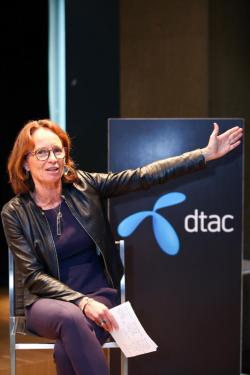Amuch-repeated urban legend about golf says the name is an acronym: Gentlemen Only Ladies Forbidden. Yet the game is what gave Alexandra Reich the mindset to become one of Thailand's most prominent CEOs.

Mrs Reich rallies the troops. Her main directive from the Telenor board is to 'make DTAC great again'.
Mrs Reich came into her role at Total Access Communication (DTAC) in August, at a time of turmoil in the company, and was able to approach and get through the situation with methodical calmness under the sort of pressure best developed on the putting green of hole 18 in a competitive match.
"I do my best thinking under pressure," she says. "What I learned from golf is to stay calm through the rough times, don't get nervous and be your best when the pressure's at its highest."
Born in Austria as the youngest of four kids, she played golf at competitive levels in her youth on the country's national team. She won the Austrian Championship and competed in the European Championship.
Her father, who died when she was young, was convinced that a woman should never be dependent on anyone. He instilled in her the importance of hard work and financial independence. So throughout her studies and golf practice, she still worked a part-time job at a squash club, waiting tables, serving drinks and cooking.
"My father was a very inspiring man with incredible values," she says.

Mrs Reich says being No.1 is less important than providing the best customer service.
Mrs Reich began her career as an entrepreneur, launching a tech startup in 1988, before the term "startup" was a thing. Her company produced interactive programs on floppy disks for the Austrian and Swiss governments. She says this time was her toughest challenge in leadership, and nothing since has come close.
"Managing 20 to 30 scruffy young people was definitely a challenge," she says. "I never knew if they would come to work or go hang out at a bar. I don't have these problems today."
But her move to Thailand after leading the Hungarian arm of Telenor (DTAC's Norwegian parent company) came with its own challenges.
She dropped down into a new country, in a new job, at one of the most difficult times for DTAC in years. The company was facing the end of concessions and was set to lose its 850- and 1800MHz spectra, along with the thousands of 2G customers using them. The company had to sue the telecom regulator to gain a remedy period to transition customers, eventually winning the right after a high-stakes auction of the 900MHz spectrum.
To win the auction, Mrs Reich had to convince DTAC board members that if they wanted to see the business grow again, they needed the coverage. The board decided to trust their newly appointed chief executive and green-lit the 38-billion-baht auction bid.
"It was like being dropped down in a firefight," Mrs Reich says. "My predecessor left quite suddenly and I didn't have much time to prepare. When we finally won the 900MHz spectrum, I was so tired I could barely celebrate."
With the immediate crisis averted, she is now free to begin crafting the company in her own image. As they were for her father, values are an extremely important part of her life. These include honesty, transparency and a drive to foster collaboration.
She's found that relying on the knowledge of others and meeting her colleagues one-on-one has resulted in a more open and transparent work environment, with more people willing to speak up and give honest opinions.
"People sometimes behave differently in front of a broader audience and won't fully speak up," Mrs Reich says. "Women especially will be much more outspoken and honest in a one-on-one conversation."
She has vowed to turn around the company's growth in 2019 after five years of falling revenue and market share, stuck in the No.3 spot behind True and AIS. Her main directive from the Telenor board was to "make DTAC great again", but improving the customer experience is still her biggest priority.
"It's not so important to be number one," she says. "I'm more concerned with providing the best service to the customer."
Mrs Reich was surprised by the enthusiasm and loyalty DTAC customers had for the brand; she was even stopped in the street by a customer who was rooting for DTAC to come out ahead, as if it were the national football team.
For inspiration, she looks to former chief executive Sigve Brekke, who ran DTAC from 2002 to 2008 and is seen as the man who built the company into what it is today. "When I look at you, I see Sigve coming back," a Telenor executive told Mrs Reich about her performance so far at DTAC.
"It meant a lot," she says.
Her next focus for the company is bringing DTAC into the 5G era. AIS and True are already testing 5G in small public demonstrations, and she doesn't want DTAC to fall behind. She hopes that the implementation of 5G, which will take far greater infrastructure investment than past wireless generations, can be done collaboratively through a public-private partnership.
"5G is all about collaboration," she says. "At the moment it is too expensive to see a business case for 5G, especially if we all have to build our own infrastructure independently."
Despite the many international moves in her life, she says she wants to stay in Thailand for the long term. Her husband will move to the country shortly, and her son has expressed interest in working in Bangkok. She also has a daughter and two "more or less" adopted children from Nepal, and she plans to spend Christmas with her family together in Thailand.
"I already fell in love with DTAC and Thailand before moving here," Mrs Reich says. "I hate the cold and have no plans of moving back to Europe. I'm fully committed to a career in Asia."
These days she doesn't have much time to get back on the golf course -- a hazard of the time-consuming nature of her new posting -- but she has found the game a useful tool in the business world nonetheless.
"You learn a lot about people on the golf course," she says. "You see people not behaving nicely, getting flustered. You can tell who they really are and how they operate under pressure."